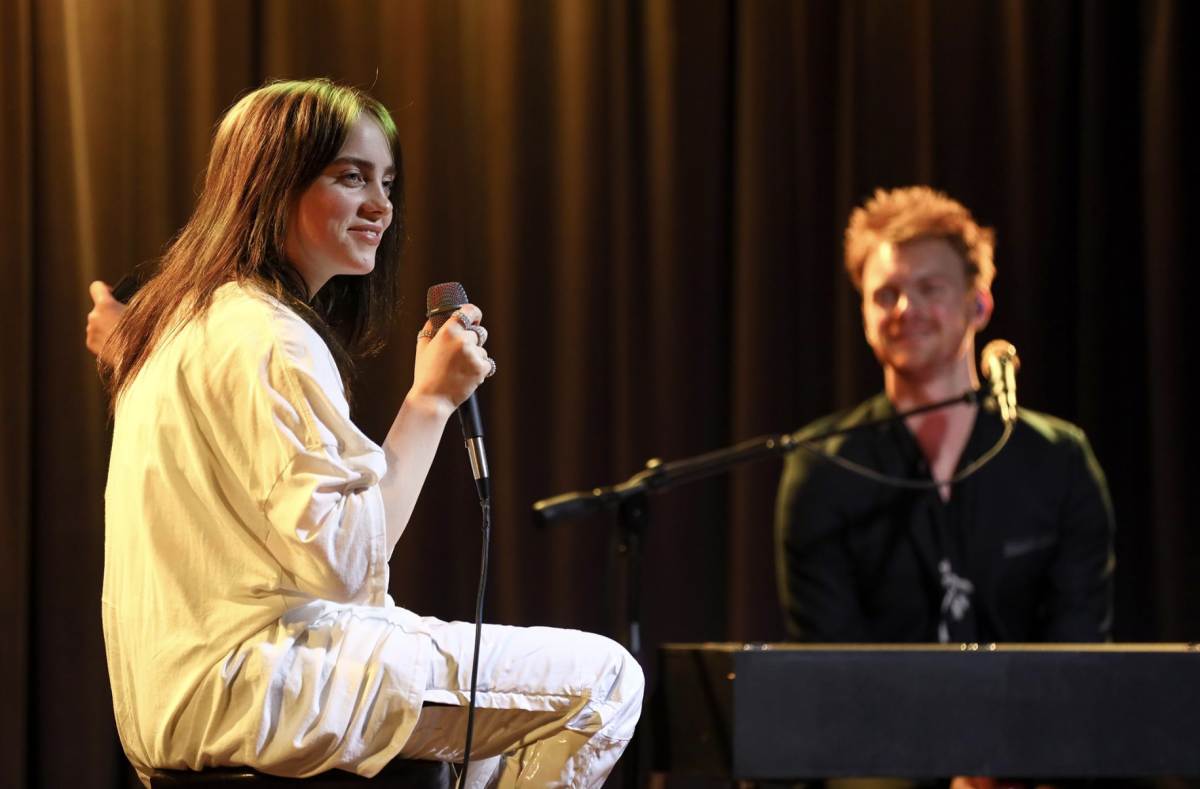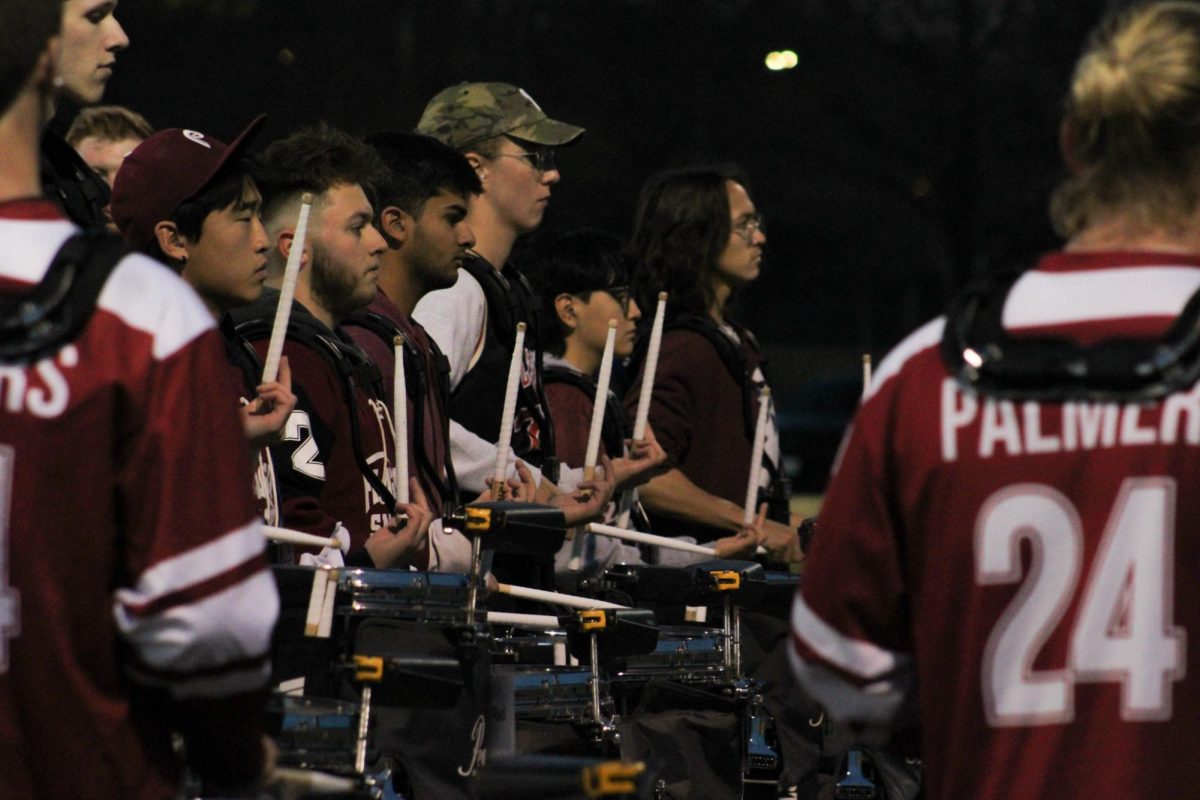
An icon of folk and protest music came to University of Massachusetts Friday night. He played before an audience whose members were often old enough to already know first-hand the artist’s historical significance. Missing in the audience were the youth that populate Arlo Guthrie’s stories (both spoken and sung) concerning anti-war and civil rights protests at the height of those movements at the end of the 1960s.
Three generations of the Guthrie family joined together on the first stop of “The Guthrie Family Rides Again” at the Fine Art Center’s Concert Hall. The reunion was the first since their previous tour ended in 2010.
“Now there’s a whole new generation of kids,” said Guthrie of his grandchildren, the littlest of which scampered around the stage during rehearsal. “It’s more like a circus than anything else. I feel like a ringleader.”
“I’m singing too, Pop,” Arlo’s son, Abe, said from behind his keyboard at the back of the stage.
“Oh you are? Well then put yourself in there,” Arlo said over his shoulder, indicating to turn up the volume.
Between daughters Sarah Lee, who performs with husband Johnny Irion, and Cathy, whose band “Folk Uke” released their first album in 2005, Arlo Guthrie has spawned an abundance of performers.
“Some are more comfortable in front of the crowd, so they take on more of a leading role than they would in the hierarchy of the family,” Arlo said of the unique presence each Guthrie brought to the stage.
Sarah Lee Guthrie and Johnny Irion opened the show with a duet. The two ended a nine-show run with Philip Price and Flora Reed of Northampton’s “Winterpills” in New York on Thursday. The bill may have prominently featured Arlo and his guitar, but the night’s music was more concentrated on the family’s talents as the microphone passed around from Annie to Cathy, Sarah Lee and Johnny, Krishna – who teased a surprising “Rambling Man” – Mo, and even Annie’s young daughters.
The performance was the first of three for the Guthrie family in preparation for a year-long tour on the 100th anniversary of family patriarch and legendary folk singer Woody Guthrie’s birth. Near the end of the family rendition of Woody Guthrie’s seminal “This Land is Your Land” the family stopped on cue as Arlo stepped out of song and into story like he did so many other times in the night.
With sincere, folksy wit he recounted his 5th-grade classmates singing “This Land is Your Land” and his own embarrassment for not knowing the words. He ran home and had his father teach him the song, including one verse the kids at school hadn’t heard.
“It was the last verse he ever sang to me,” Guthrie said, before singing the rare lines: “Nobody living can ever stop me/As I go walking that freedom highway/Nobody living can ever make me turn back/This land was made for you and me.”
Guthrie called the story a lesson in civil disobedience and education, and one he carried with him through the civil rights movements of the subsequent decade. A year out of high school, Arlo quickly learned that Rocky Mountain College in Billings, Mont. wasn’t for him.
“I knew there was a world out there that I wanted to participate in. I wanted to be in the demonstrations that were going on – on the West Coast and the East Coast, but there wasn’t [sic] a whole lot of demonstrations going on in Wyoming and Montana. Not at that time,” said Guthrie. “So I left college and grabbed my guitar, and I went to hang out in the streets with people who I thought had something to say. I wanted to be there. I didn’t want to miss it.
“I’m not a big fan of academic learning in the traditional sense. I’m really a fan of people who learn from others in the way that best suites them. Some people learn really good [sic] in classrooms. That’s fine with me. I don’t have a problem with it. Other people like myself learn more from other people, so I’ve spent my life meeting and hanging out with, as best as possible, people of interest.”
Pete Seeger was one of those guys. Guthrie spent 30 years playing shows on the road with Seeger, and from that, he said, he got his education.
“The way that he lived his life and performed his art was to me inspirational. There’s no class that I could have taken to have learned that. There’s no degree I could have got.”
He described being repeatedly cautioned against his easygoing lifestyle; he was advised to learn a trade to fall back on. But Guthrie never regretted ignoring that kind of advice.
“If you really want to do something, don’t listen to anybody,” he said. “Don’t learn anything that’s not useful. Don’t waste your time. Do the things that interest you. Be open to however the universe opens its doors to you and go through them.”
On the heels of his performance alongside 92-year-old Seeger last month at Zuccotti Park in New York, the epicenter of the Occupy Wall Street protests, Guthrie told the story of a farmer robbed of his land by a bank.
“Now, on the other hand, a farmer robs a bank,” Guthrie said, trailing off to instant applause from the audience who caught the irony.
After the last song of the set, it didn’t take long for the audience to summon the family back on stage, as a sea of balding heads took to their feet in applause, hoots and hollers.
The Guthrie family will play their annual show at the Carnegie Hall on Saturday, Nov. 26.
Brian Canova can be reached at [email protected].













Janice Mcduffy • Jan 15, 2012 at 11:19 am
I am so grateful for your blog post. Really Cool.
Celia Lang • Nov 21, 2011 at 8:56 pm
Thanks for the perspective on Arlo’s recent concert at FAC. I had the same feeling…why am I surrounded by people in their mid-50’s (I’m in my mid 50’s too) – How come the FAC isn’t filled to the brim with college students?
It was their loss. And a sad commentary on how we’ve has lost touch with the original pioneers of Occupy America – Woody Guthrie, Arlo and Family, Pete Seeger.
Perhaps we need a 3 credit college elective to re-introduce some of the best American pride and protest music. Great concert. Googled your article looking for comment about the show. Thanks, Celia. Montague, MA